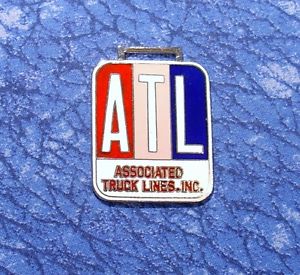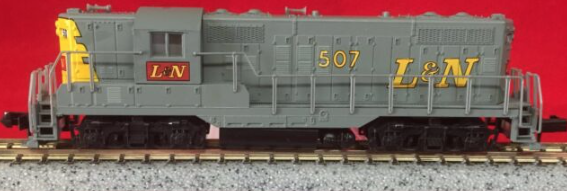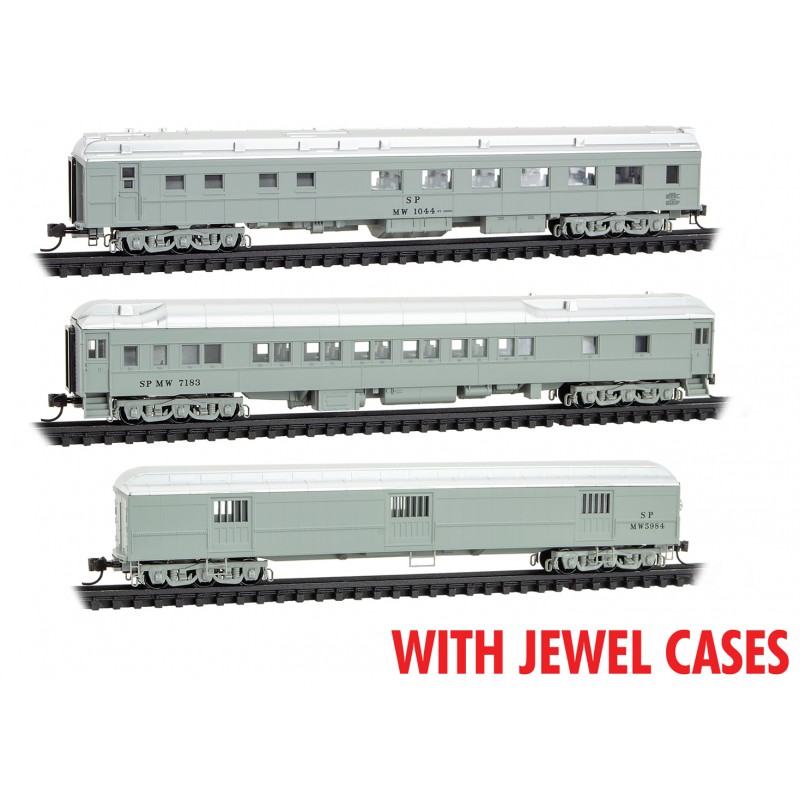Prototype History: A flatcar (US) (also flat car (US) or flat wagon (UIC)) is a piece of railroad (US) or railway (non-US) rolling stock that consists of an open, flat deck mounted on a pair of trucks (US) or bogies (UK), one at each end containing four or six wheels. Occasionally, flat cars designed to carry extra heavy or extra large loads are mounted on a pair (or rarely, more) of bogeys under each end . The deck of the car can be wood or steel, and the sides of the deck can include pockets for stakes or tie-down points to secure loads. Flatcars designed for carrying machinery have sliding chain assemblies recessed in the deck.
Flatcars are used for loads that are too large or cumbersome to load in enclosed cars such as boxcars. They are also often used to transport intermodal containers (shipping containers) or trailers as part of intermodal freight transport shipping.
COFC (Container On Flat Car) cars are typically 89' long and carry four 20' intermodal containers or two 40'/45' shipping containers (the two 45' containers are carryable due to the fact that the car is actually 92' long, over the strike plates). With the rise of intermodal freight transport-specific well cars that allow double stacking, and given the age of most of these flats, numbers will decline over the next several years
From Wikipedia
Flatcars are used for loads that are too large or cumbersome to load in enclosed cars such as boxcars. They are also often used to transport intermodal containers (shipping containers) or trailers as part of intermodal freight transport shipping.
COFC (Container On Flat Car) cars are typically 89' long and carry four 20' intermodal containers or two 40'/45' shipping containers (the two 45' containers are carryable due to the fact that the car is actually 92' long, over the strike plates). With the rise of intermodal freight transport-specific well cars that allow double stacking, and given the age of most of these flats, numbers will decline over the next several years
From Wikipedia
Road Name History: TTX Company (formerly Trailer Train until 1991) is a leading provider of railcars and related freight car management services to the North American rail industry. TTX's pool of railcars (over 220,000 cars and intermodal wells) is ideal for supporting shippers in the intermodal, automotive, paper & forest, metals, machinery, wind energy and other markets where flatcars, boxcars and gondolas are required.
Owned by North America's leading railroads, TTX's free-running pools provide fungible assets that minimize total empty miles, further lowering costs and minimizing risk for the industry, helping the railroads conserve their capital for other critical infrastructure needs. Customers easily recognize TTX's bright yellow cars as a consistent, high quality, well-maintained fleet that serves many transportation needs.
Owned by North America's leading railroads, TTX's free-running pools provide fungible assets that minimize total empty miles, further lowering costs and minimizing risk for the industry, helping the railroads conserve their capital for other critical infrastructure needs. Customers easily recognize TTX's bright yellow cars as a consistent, high quality, well-maintained fleet that serves many transportation needs.
Brand/Importer Information: Micro-Trains is the brand name used by both Kadee Quality Products and Micro-Trains Line. For a history of the relationship between the brand and the two companies, please consult our Micro-Trains Collector's Guide.
Manufacturer Information:  Micro-Trains Line split off from Kadee Quality Products in 1990. Kadee Quality Products originally got involved in N-Scale by producing a scaled-down version of their successful HO Magne-Matic knuckle coupler system. This coupler was superior to the ubiquitous 'Rapido' style coupler due to two primary factors: superior realistic appearance and the ability to automatically uncouple when stopped over a magnet embedded in a section of track. The success of these couplers in N-Scale quickly translated to the production of trucks, wheels and in 1972 a release of ready-to-run box cars.
Micro-Trains Line split off from Kadee Quality Products in 1990. Kadee Quality Products originally got involved in N-Scale by producing a scaled-down version of their successful HO Magne-Matic knuckle coupler system. This coupler was superior to the ubiquitous 'Rapido' style coupler due to two primary factors: superior realistic appearance and the ability to automatically uncouple when stopped over a magnet embedded in a section of track. The success of these couplers in N-Scale quickly translated to the production of trucks, wheels and in 1972 a release of ready-to-run box cars.
Micro-Trains Line Co. split off from Kadee in 1990 to form a completely independent company. For this reason, products from this company can appear with labels from both enterprises. Due to the nature of production idiosyncrasies and various random factors, the rolling stock from Micro-Trains can have all sorts of interesting variations in both their packaging as well as the products themselves. When acquiring an MTL product it is very important to understand these important production variations that can greatly enhance (or decrease) the value of your purchase.
Please consult our Micro-Trains Collector's Guide

Micro-Trains Line Co. split off from Kadee in 1990 to form a completely independent company. For this reason, products from this company can appear with labels from both enterprises. Due to the nature of production idiosyncrasies and various random factors, the rolling stock from Micro-Trains can have all sorts of interesting variations in both their packaging as well as the products themselves. When acquiring an MTL product it is very important to understand these important production variations that can greatly enhance (or decrease) the value of your purchase.
Please consult our Micro-Trains Collector's Guide
Item created by: Lethe on 2015-05-31 17:46:30. Last edited by Powderman on 2021-02-25 13:50:36
If you see errors or missing data in this entry, please feel free to log in and edit it. Anyone with a Gmail account can log in instantly.
If you see errors or missing data in this entry, please feel free to log in and edit it. Anyone with a Gmail account can log in instantly.











